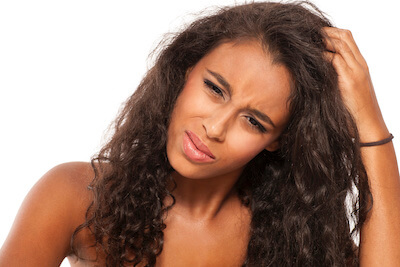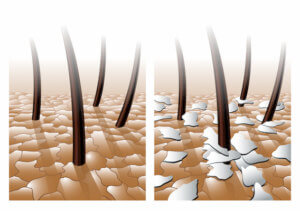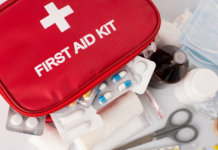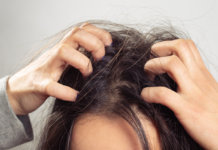Dry Scalp Shampoo: What Those Promising Bottles Don’t Tell You
Most shampoos we use should be named Dry Scalp Shampoo, since many of them are experts in causing conditions such as dandruff, dryness or itchiness.
These conditions develop to show us how our skin reacts to the substances found in shampoos and other hair care products.
Therefore, to better understand how these chemicals affect the skin on your head, we first need to learn about the microbiome of the scalp.
The Microbiome of the Scalp
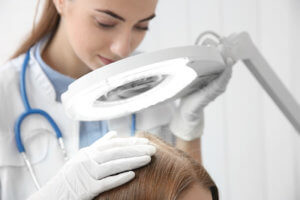
Environmental effects (the scalp global warming), such as the use of hair care products, can sometimes disrupt the balance in the scalp’s microbiome. Scientists are researching the possible connections between such imbalances and the development of different scalp conditions, like the appearance of dandruff or seborrheic dermatitis.
Scalp’s Composition
The outermost layer of the skin (Stratum Corneum) is at the forefront of the skin’s protective barrier. This part of the epidermis is responsible for stopping the passive loss of water and for preventing harmful substances and microorganisms from entering the body. This is why the proper functioning of the stratum corneum is important.
Furthermore, certain studies have shown that the scalp’s barrier function is lower than other parts of the skin. Which explains why the signs of its susceptibility to skin conditions are more easily detected.
What Causes Scalp Dryness?
The scalp, when covered with hair, is naturally a moist and oily area of the skin. These moist conditions are a sign that the stratum corneum barrier is functioning normally. However, when this layer of skin is exposed to frequent cleansing with various products containing aggressive ingredients, it gets damaged.
This harm causes the barrier to malfunction, prompting a significant loss of moisture and therefore the dryness of the scalp.
Dry scalp can become inflamed, sore, less elastic, itchy, and prone to cracking.
In most cases, the substances responsible for this kind of damage are the so-called surfactants. They are a common ingredient of many hair care products.
Surfactants in your Dry Scalp Shampoo
Surfactants are detergents for the hair. They attract oil and water, especially the secretion of sebum, which makes our hair and scalp oily.
Surfactants are the most important part of any shampoo formula. Usually these formulas contain more than one surfactant to fully accomplish their multiple roles, like:
- cleansing the hair and skin
- foaming
- scent-carrying
- transferring active components needed in the hair and the scalp
- contributing to the overall appearance and viscosity of the shampoo.
Here are some common surfactants found in the ingredients list of shampoo labels:
- Sodium Laureth Sulfate
- Sodium Lauryl Sulfate
- TEA Lauryl Sulfate
- Ammonium Laureth Sulfate
- Ammonium Lauryl Sulfate
- DEA Lauryl Sulfate
- Sodium Olefin Sulfonate
Now, not everybody’s hair is equally oily. Stronger shampoos, with more or harsher surfactants, are used for washing extremely oily hair. Dyed and sensitive hair requires the use of milder shampoos. According to their hair-cleansing characteristics and the types of surfactants they contain, shampoos are divided into five different categories:
- Anionic
- Cationic
- Amphoteric
- Nonionic, and
- Natural surfactant shampoos.
Regardless of the type of shampoo, its formula has to be adapted to achieve the effect of clean, but not too clean, hair! Surfactants might be detergent-like, but they are not meant to completely rid the hair and scalp of their protective components. The removal of all sebum is never recommended. Hair completely free of sebum would end up looking extremely dry, washed out, tangled, and unhealthy. The frequent use of such harsh products often results in damage to the scalp and the impairment of the skin barrier function.
Your Dry Scalp Shampoo, The Bottom Line
Shampoo surfactants are irritants and they can cause the scalp skin to become dry, sore, and itchy. There is a direct connection between the cleansing power and the irritative potential of shampoos. All haircare products should provide a balance between cleanliness, aesthetics and the well-being of the hair and skin. New shampoo formulas with more natural ingredients are a great prospect for the future and the research in that field should be encouraged.

